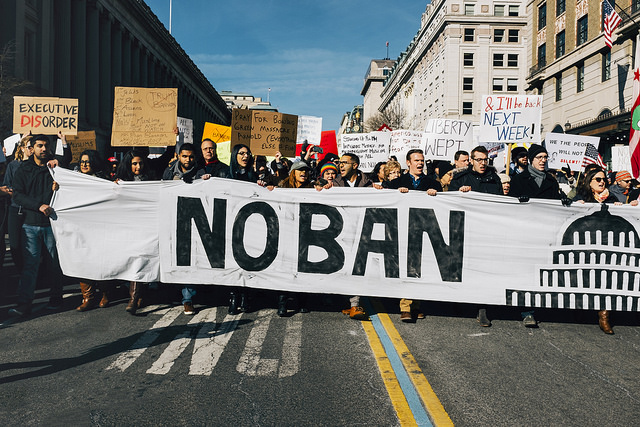
March 15, 2017; New York Times
Lawyers for the Trump administration were deployed in Hawaii, Maryland, and Seattle to argue against the multiple suits seeking to invalidate the new executive order on immigration announced on March 6th after the first temporary travel ban issued on January 27th was overturned. (The new executive order was to have been implemented yesterday.) The administration’s attorneys were charged with arguing that the order was merely an exercise of the president’s national security powers and that no exclusion based on religion was intended.
But in Hawaii, where the lawsuit was brought by Hawaii’s attorney general, Doug Chin, Judge Derrick K. Watson halted the order nationwide after declaring he was unconvinced that what the president and his allies have been saying and what he has done are unrelated. “Are you saying we close our eyes to the sequence of statements before this?” he asked.
“The illogic of the Government’s contentions is palpable. The notion that one can demonstrate animus toward any group of people only by targeting all of them at once is fundamentally flawed,” Watson wrote.
“Equally flawed is the notion that the Executive Order cannot be found to have targeted Islam because it applies to all individuals in the six referenced countries,” Watson added. “It is undisputed, using the primary source upon which the Government itself relies, that these six countries have overwhelmingly Muslim populations that range from 90.7 percent to 99.8 percent.”
Sign up for our free newsletters
Subscribe to NPQ's newsletters to have our top stories delivered directly to your inbox.
By signing up, you agree to our privacy policy and terms of use, and to receive messages from NPQ and our partners.
“It would therefore be no paradigmatic leap to conclude that targeting these countries likewise targets Islam,” Watson added. “Certainly, it would be inappropriate to conclude, as the Government does, that it does not.”
Early Thursday morning, a Maryland federal court issued its own preliminary injunction against the temporary suspension travel to the U.S. by residents of the six affected countries not already having visas or green cards. However, it did not stay the execution of other provisions of the new executive order, including those pertaining to refugees.
Cited in the suits brought to reverse the order were numerous statements made by the president and his allies that betray the intentions of the administration before and after the transition and run counter to the legal arguments now being made. During his campaign for president, Trump proposed to bar all Muslims from entering the United States, later replacing that with a proposal to ban travel from a variety of Muslim countries identified in an Obama-era restriction. Former NYC Mayor Rudolph W. Giuliani, who is an advisor to Trump, also let slip that he had been asked to help shape a Muslim ban that could get through any legal challenges. Stephen Miller, an adviser to the president, has also been quoted as saying that any changes to Mr. Trump’s first temporary travel ban are technical and designed to get essentially the same policy contained in the first executive order by the court.
The lawsuits have not only claimed that the order is based on religious exclusion but they also assert that the order disrupts the functions of companies, charities, public universities and hospitals. In fact, as we have mentioned previously, tech companies have made the rescission of the ban their business; nearly 60 dozen technology companies joined in a brief on the case brought in Hawaii.
The new order would halt the granting of new visas and green cards to people from six majority-Muslim countries—Iran, Libya, Somalia, Sudan, Syria and Yemen—for at least 90 days. (Omitted from this list but present in the initial order is the nation of Iraq.) In the order, Trump stated, “Each of these countries is a state sponsor of terrorism, has been significantly compromised by terrorist organizations, or contains active conflict zones.” The second order also suspended refugee resettlement for 120 days and limits refugee admissions to 50,000 people in the current fiscal year—essentially cutting it in half from what the numbers were under Obama. For now, at least, those plans are on hold, but advocates should not stand down by any means, as the administration is expected to file appeals of the judges’ decisions.—Ruth McCambridge













